
Pau Folch Marín, STEAM teacher and EduMaker at Pla Marcell de Cardedeu Institute (Barcelona)
Moderator: Jordi Regalés Barta, technical professor at the technological area of the CESIRE, Department of Education, Generalitat of Catalonia.Barcelona
In the summer of 2019, a group of teachers, students and families from the Pla Marcell Institute, in Cardedeu, transformed the Technology Workshop into a Maker Space, as one of the objectives of our center within the STEAMcat project. Inspired by the philosophy of creating learning environments of the Future Classroom Lab, and with an eye on other Fablabs in our environment, the objective was to create a more friendly and stimulating space, which would favor creation and interaction among students, allowing new ways of learning from doing, reflecting and communicating. Our Maker Space consists of a research and creation space, where we usually work with electronics, robotics, laboratory material, personal computers, ‘clean’ tools, and where we have 3D printers, laser cutters, vinyl cutters, etc .; an area for interaction and presentation, with a large table and a television; and a closed area of traditional machinery and tools, where we can cut and ‘stain’ everything we want. But beyond the physical spaces and the machines, the Maker Space has transformed some of our practices, towards models focused on the practice of students with a maker perspective, allowing the personalization of learning and products, incorporating digital manufacturing on a daily basis, invigorating playground activities, projects of various subjects, workshops during the afternoon,… A living space for creation and learning!
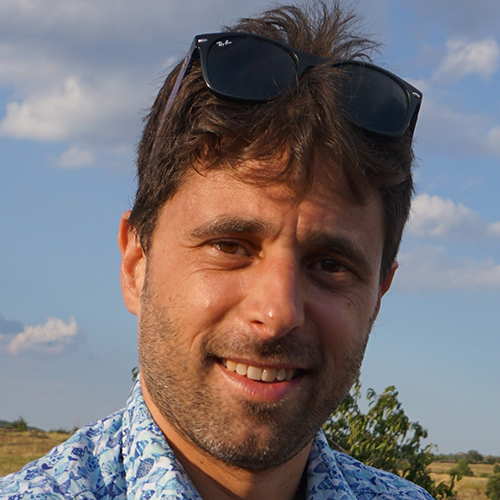
Industrial Technical Engineer has a 16-year career as a teacher. TAC Trainer of the Department of Education, he has worked 7 years in a Pedagogical Resource Center, as a teaching technical advisor and coordinating several work groups. He is passionate about programming and educational electronics with a STEAM perspective, ABP, DIY, digital design and manufacturing processes, projects about space… an EduMaker, who hasn’t got enough time to learn everything that motivates him.
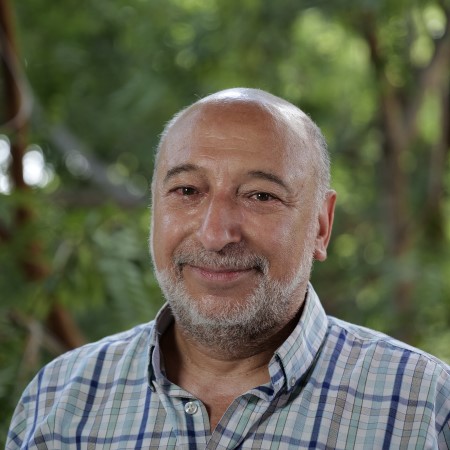
Engineer and postgraduate in Technology Teaching by the Universitat Politècnica de Catalunya (UPC), he has published didactic materials for teaching technology to various publishers, the Department of Education, and the National Museum of Science and Technology of Catalonia. He has collaborated with several educational equipment firms to design and develop educational resources and user guides. He was a former teacher in the master’s degree for secondary school teachers at the UPC and currently a trainer of trainers at the Department of Education. He is a Technology and Electronic Systems professor at secondary education.
Sara Pardo Fernandez, graduated in early childhood education at Universitat de Vic, Montessori School, Rubí (Barcelona).
Moderator: Montse González, learning technician in the artistic field of CESIRE and collaborator of the Network of Basic Competences of the Department of Education of the Generalitat de Catalunya.
The Montessori school began a process of methodological transformation in the 2016-2017 academic year, developing a Management Project that, from a globalized and meaningful perspective, had the objective of giving prominence to the students, while empowering the pedagogical team to lead all change processes in a shared way. With the support of the Magnet program, the advice of Frank Sabaté and the CIM-UPC Foundation as a partner, the entire community was oriented to work to promote STEAM vocations. The work in the workshops is the mainstay of the whole project, focused and programmed with a maker approach. Broadening the different methodologies that could provide strategies to achieve an objective, the knowledge of Tinkering was deepened, and now is part of the center’s day-to-day running. We’ll present this experience in this session.
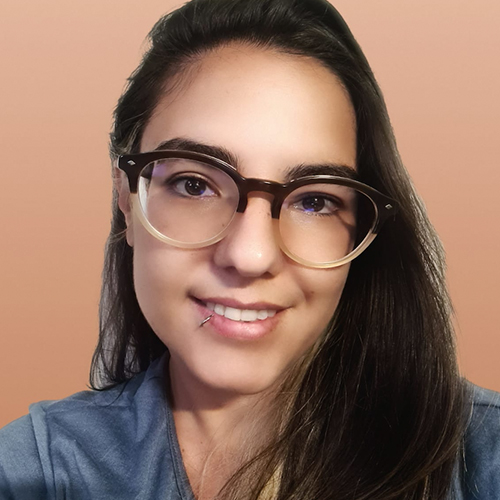
Graduated in Early Childhood Education from the University of Vic (2009), she gained access by opposition to the body of teachers (2010). She is a teacher by vocation, a member of the Magnet Project as well as of the Digital Commission of the Montessori school in Rubí, where she works and develops her passion: art, new technologies and educational innovation. She promotes teamwork and the autonomy of the students from the community at educational centers.
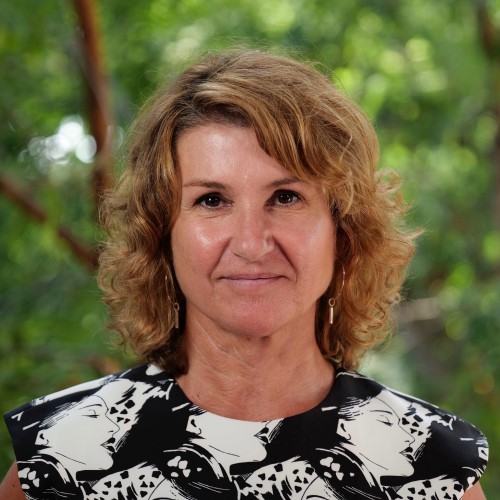
Learning technician in the artistic field of CESIRE and collaborator of the Network of Basic Competences of the Department of Education of the Generalitat de Catalunya. Primary School Teacher and Music Education Specialist. He is currently collaborating in the training of teachers from the Transversal Axes of Pedagogical Innovation for the improvement of the school’s educational project.
María Belloch Cobles Pont, teacher of early childhood education. Escola Mestre Morera, Barcelona.
Elisa Soriano Rider, Terapeuta Ocupacional (UVic) i Dinamitzadora/ Responsable del Programa Pedagògic de l’Ateneu de Fabricació de Ciutat Meridiana (Ajuntament de Barcelona).
Moderator: Martí Burriel, In charge of the digital fabrication programs at the Consorci d’Educació de Barcelona, and coordinator of the educational services of the Xarxa d’Ateneus de Fabricació of the Barcelona City Council, Barcelona.
The Escola Mestre Morera has carried out a joint project with the Ateneu de Fabricació Ciudad Meridiana, next door to the school. It is a proposal aimed at children from P3 and P4, in the framework of the program, on rights of children of the Barcelona City Council: «With the eyes of a child» . The project, with an integral approach, worked on all areas of the curriculum, culminating in the Ateneu with the production of vinyl stickers representing the rights of children worked in the classroom As 3-year-old children, in general, are not yet in a figurative drawing stage, it was decided that this group would work it from photographs with their body. The group of 4-year-old children would work with drawings.The ‘inkscape’ program has been used for the project, which converts photographs and drawings into vector images.The technologist did the technical work and the children have been able to participate by experiencing how their drawings / photos were materialized in stickers.The fact of adding to the project this part of work with the Ateneu with a final product such as the stickers, made girls and boys, feel super motivated while experimenting a first approach and discovery of technologies, providing as well visibility and value the Ateneu and its activities as a neighborhood entity, open to all.
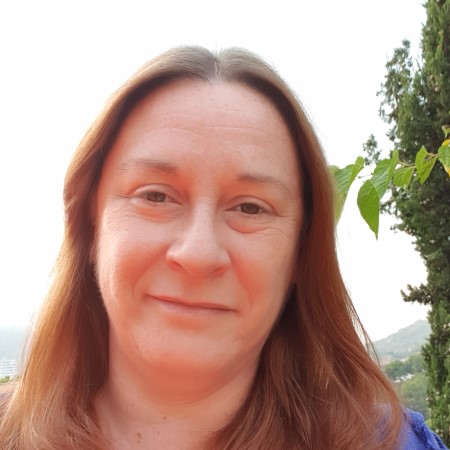
Graduated from the University of Vic, where she finished her studies in 1999. Years later, Maria decided to start her profession. At the beginning with substitutions of short duration, but with time and experience, with longer and more profitable substitutions. Maria, now has more than twelve years of experience. Before joining the Mestre Morera School where, in the last five years, she has carried out tasks in primary and nursery school as reinforcement and as a tutor, she was involved in the educational transformation that is currently emerging in schools. At the Mestre Morera school, says María, ‘we are very involved in the evolution of our children and open to constant updating in methodologies and technologies available to carry out an integral teaching based also on emotions.’
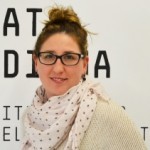
Diplomada en Teràpia Ocupacional per la Universitat de Vic (UVic) i Tècnica en Grau Superior d’Integració Social. Des de fa sis anys treballa com a dinamitzadora a l’, Ateneu de Fabricació de Ciutat Meridiana (Ajuntament de Barcelona) Responsable del Programa Pedagògic, del Programa d’innovació i Programa Famílies de l’espai. L’ateneu és un servei públic que divulga tecnologia i ciència a través de la fabricació digital. Un lloc per crear i aprendre, col·laborar en diferents projectes i formar part del desenvolupament social de la ciutadania; on tothom pot gaudir d’espais, eines i recursos públics per proposar projectes que millorin l’entorn més proper. Convençuda de l’impacte de la fabricació digital en l’àmbit comunitari i pedagògic com a eina i mitjà d’empoderar a la ciutat, donant l’oportunitat de democratitzar la tecnologia més innovadora a tothom, independentment de la seva situació socio econòmica, ens permet humanitzar la tecnologia.
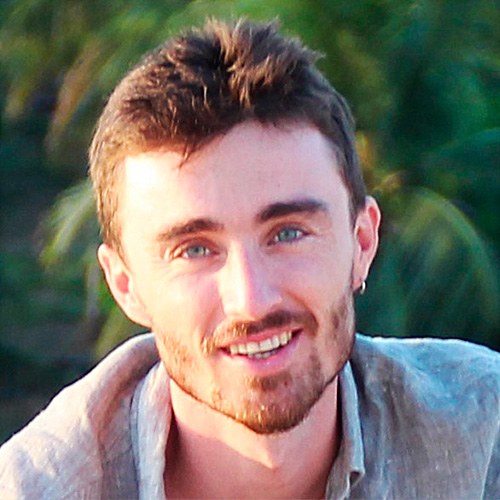
Graduated in Environmental Sciences from the Universitat Autònoma de Barcelona (UAB) specialized in management restoration of the natural environment, and a secondary school teacher. Martí gained experience as a researcher at the Institute of Ciència i Tecnologia Ambiental (ICTA-UAB) and as technical director of the UAB Science Diffusion Observatory. In the private sector (Lavola), as a coordinator of educational innovation projects and head of the Creactivity space at CosmoCaixa: the Science Museum of Barcelona. Currently, Martí applies the sum of those experiences in the public sphere as a reference in digital manufacturing for the Consorci d’Educació de Barcelonaa and as a coordinator of the Barcelona Network of Ateneus de Fabricació of the Barcelona City Council.
Eva Bernabeu Farrús, primary school teacher and head of studies at the Miralletes School, Barcelona.
Moderator: Susana Navarro, In charge of STEAM programs at the Barcelona Education Consortium, Barcelona.
The process of creating the Tinkering space at the Miralletes school is part of a methodological project that we started about four years ago. While implementing this new project, we began our participation in the Magnet program in partnership with CosmoCaixa, which helped us to develop an innovative, quality educational project that was open to the environment. Thanks to this alliance we have been able to influence an interdisciplinary task incorporating science and technology into our classroom projects, connecting knowledge, generating a critical dialogue and building knowledge. The Tinkering space has allowed us to build more transversal educational experiences that integrate the complexity of real problems and that, at the same time, promote collaboration and creativity.
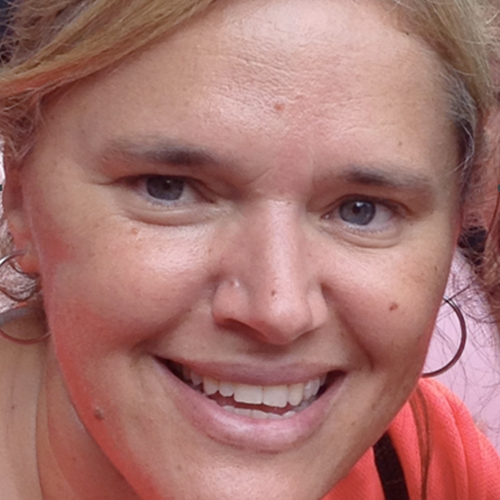
She obtained a diploma from the Blanquerna University in Primary Education and a degree in Humanities from the Universitat Oberta de Catalunya (UOC). She likes to define the center where she works as an open and welcoming school, alive, where there are movements, laughs, noises, and where you can enjoy spaces of calm and listening, that is how life moves, making diversity our wealth.
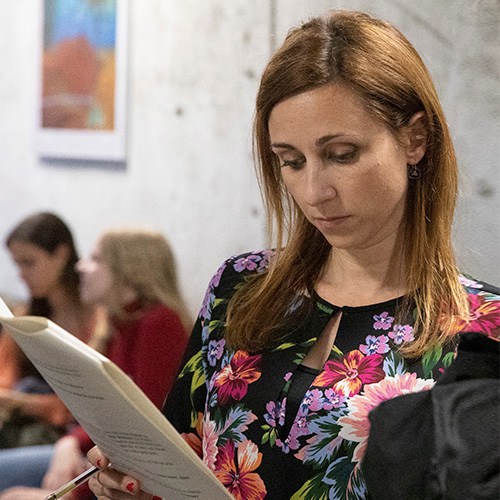
Susanna is responsible for the STEAM educational innovation programs and sustainability of the Consorci d’Educació de Barcelona, an institution for which she was an advisor on technology used in the classroom. She was a pedagogical designer and programmer of various multimedia educational games and online tutor training courses. She is a pedagogue from the Universitat de Barcelona (UB) and postgraduate in e-learning from the Universitat Oberta de Catalunya (UOC).
Amelia Mañà, Professor of Visual and Plastic Education & Joan Pedroche, Professor of Technology, IEA Oriol Martorell, Barcelona.
Moderator: Martí Burriel, In charge of the digital fabrication programs at the Consorci d’Educació de Barcelona, and coordinator of the educational services of the Xarxa d’Ateneus de Fabricació of the Barcelona City Council, Barcelona.
We present two STEAM experiences. The first, ‘Geometry on stage’, took place in the strip STEAM of 2nd ESO, which integrates co-teaching with teachers of science, technology, music and dance. The second is called “Burlap to document the pandemic” and is the result of interdisciplinary work in the 4th year of ESO. “Geometry on Stage” The main challenge of the project was to develop a common code /language for music and dance, based on elements, colors and geometric shapes, to generate interpretive and improvisational resources. We decided culminate this co-creation process with a show on stage. The project also includes the construction of light polyhedra using digital fabrication, and the IoT to develop the show’s set design. Burlap to document the pandemic (4th ESO) This project is inspired by the social context and the work of the women burglars of Chile, who go denounce repression during the dictatorship through the creation of burlap (paintings made of clothes). This proposal is based on 2 main axes: On the one hand, the making of a burlap that respond to personal research on a topic around the pandemic caused by COVID-19 and, on the other on the other hand, to digitize and transform the burlap into an audiovisual narrative through the SCRATCH program
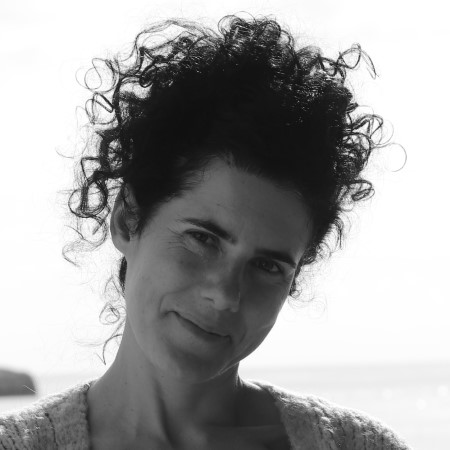
Coordinator of the 1st year of ESO. She understands her task as a secondary school teacher is to promote interdisciplinary work and to build networks with cultural and social institutions. She tries to endorse that the educational actions carried out in the center are achieved having these principles in mind. She is a social educator and pedagogue (UB). She holds two Masters, one in Neuropsychopedagogy (UdG) and another in Visual Arts and Education (UB).
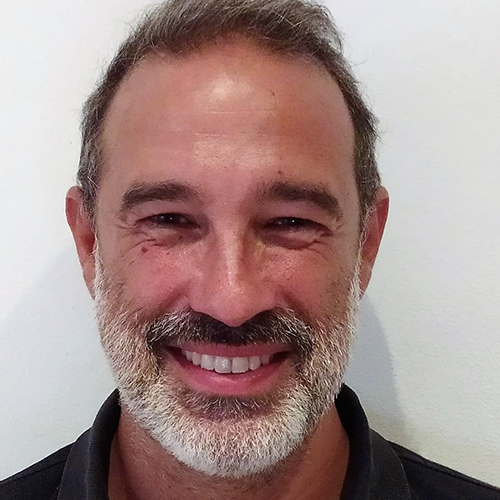
Professor of Technology at IEA Oriol Martorell. Currently he is the center’s digital and STEAM coordinator. Involved in the dissemination of creative technologies and collaborative art, he promotes the transversal team of STEAM teachers at the IEA Oriol Martorell around projects that encompass science, technology, music and dance. He is a Telecommunications Technical Engineer (UPC) and holds a Master in Digital Arts (UPF).

Graduated in Environmental Sciences from the Universitat Autònoma de Barcelona (UAB) specialized in management restoration of the natural environment, and a secondary school teacher. Martí gained experience as a researcher at the Institute of Ciència i Tecnologia Ambiental (ICTA-UAB) and as technical director of the UAB Science Diffusion Observatory. In the private sector (Lavola), as a coordinator of educational innovation projects and head of the Creactivity space at CosmoCaixa: the Science Museum of Barcelona. Currently, Martí applies the sum of those experiences in the public sphere as a reference in digital manufacturing for the Consorci d’Educació de Barcelonaa and as a coordinator of the Barcelona Network of Ateneus de Fabricació of the Barcelona City Council.
Mercè Barnés, member of the management team at Montseny School STEAMCat, Barcelona.
Moderator: Susana Navarro, In charge of STEAM programs at the Barcelona Education Consortium, Barcelona.
A few years ago at the school we were in the process of rebirth, it was a school that was about to be closed. The staff then reacted and decided to start a process of transformation. In addition, given the multiple social changes, rote learning and memorization in the times of Google did not make sense. We needed to equip students with tools that would allow them to develop scientific thinking and the ability to solve problems and face situations typical of the society of the future. The Montseny school is a school surrounded by green areas: the Park Güell forest and the Turull Forest. This environment was ideal for us to carry out a project based on experiential experimentation in nature. This was very encouraging for both teachers and families. Little by little, we built our unique project by bringing the students closer to nature on a weekly basis, revealing their curiosity to ask themselves questions, and thanks to them numerous possibilities were opened in order to work with globalized researchable projects, where the areas of media and mathematics stand out. Participation in the science congress organized by all the Pedagogical Resource Centers (CRP) in Barcelona make us question for the first time what STEAM meant, from that moment on we did not stop looking for information and we realized that many of the projects we were already doing incorporated the STEAM perspective, and that our way of doing STEAM was in nature. As the school years have progressed, we have discovered that the benefits are multiple at all levels and that the experiential learning involved in being able to observe and collect live data far exceeded the simulations of a textbook.
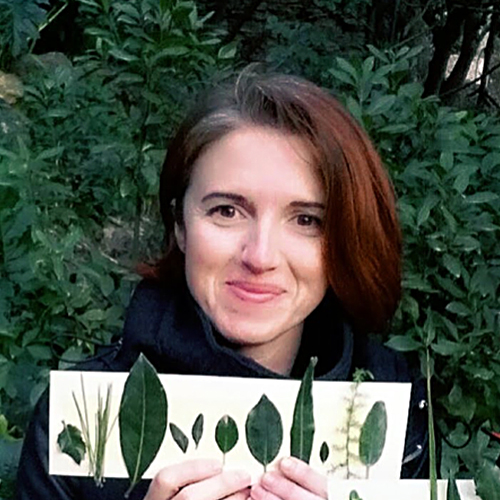
Started in the world of education as a teacher of Early Childhood Education, although over the last few years she has worked in both kindergarten and primary school. She has been a member of the management team of the Montseny school for three years, promoting in this center a project titled Nature. As a teacher, she has been fortunate to work outdoors with children and observe how they enjoy and learn in a healthy and relaxed environment. She claims that the forest is the best classroom.

Susanna is responsible for the STEAM educational innovation programs and sustainability of the Consorci d’Educació de Barcelona, an institution for which she was an advisor on technology used in the classroom. She was a pedagogical designer and programmer of various multimedia educational games and online tutor training courses. She is a pedagogue from the Universitat de Barcelona (UB) and postgraduate in e-learning from the Universitat Oberta de Catalunya (UOC).
Jesús Pérez, Teacher and director of the ESC Joan Miró Canovelles (Barcelona).
Moderator: Ester Forné, learning technician and responsible for the Artistic Field at CESIRE, Department of Education of the Generalitat de Catalunya.
Five years ago, the school decided to create its own line, and to work out dynamics that were already beginning to be effective. The need to create truly competent proposals for their achievement by the students, led us to develop STEAM proposals to the entire center. We are convinced that the school has to move towards the design of teaching-learning processes that look for the achievement of an objective, the definition of needs, planning and practice with systematic review and the presentation of results. The need to carry out this design has caused an organizational change at different levels within the school. These changes are subject to constant evolution, always taking into account the pedagogical bases of the center, dialogic learning and formative evaluation. The evidence of learning in students is overwhelming both in external and internal tests.
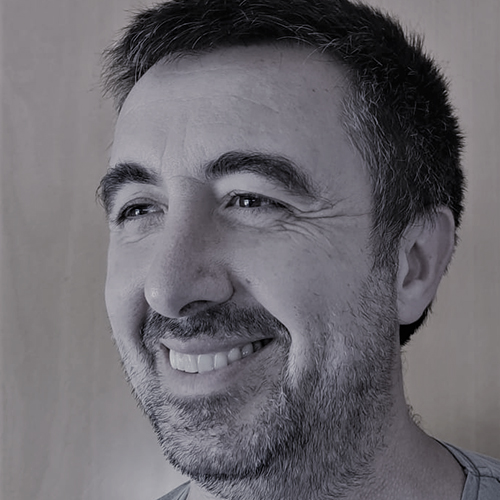
Teacher of the ESC Joan Miró de Canovelles since 1997, he is currently the director of the center and teacher in the Higher Cycle. Facilitator of Centers within the PACTO innovation program (Program for the acceleration of educational transformation / Tools for change) of the Department of Education, he is also a trainer of several CESIRE proposals and Co-creator of the materials ‘Create, design and build’ Projects with Micro: bit.
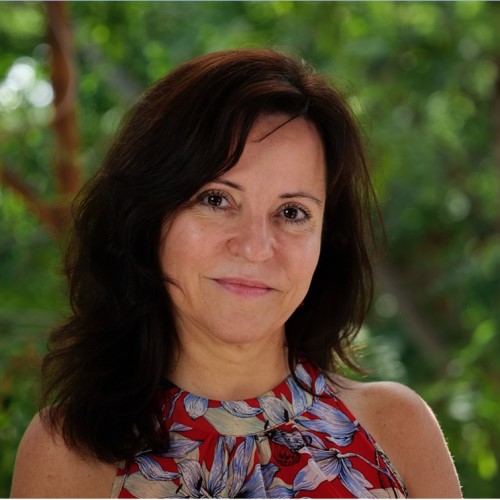
Learning technician and responsible for the Artistic Field at CESIRE, Department of Education of the Generalitat de Catalunya. She is Graduate in Primary Education and Infant Education from the Universitat Autónoma de Barcelona (UAB). Master in Art Education from a Constructionist Perspective from Universitat de Barcelona, (UB) is Professor of Art and Education in the Degree in Arts of the Universitat Oberta de Catalunya, Professor of Arts & Materials in the Master’s Degree in English in Infant and Primary Education. Univesitat Blanquerna. (URL). Member of the ICT + C team at ICE UAB. Member of the Center for Research and Studies for Organizational Development - CRIEDO. UAB.
Míriam Pellicer. Marta Esteve. David Codina, CRP VOIII of Sant Celoni. Training teachers and facilitators of Robotseny, Sant Celoni (Barcelona).
Moderator: Jordi Regalés Barta, technical professor at the technological area of the CESIRE, Department of Education, Generalitat of Catalonia.Barcelona
Robotseny is a project in the county of Baix Montseny committed to develop scientific and creative skills for students working cooperatively in Robotics. It also aims to create a network of teachers involved in this subject in order to create links and share experiences. The project takes place in the classroom and has a staging in the form of a Tournament day at the end of the school year. Students from Baix Montseny schools can participate from 5th grade to Baccalaureate and Cycles. Student participation at the contest day is divided into two categories: Robotseny Kids, aiming boys from 5th to 2nd year of ESO with two subcategories: primary and secondary, during the morning. Robotseny High, aiming students in the second cycle of ESO, Baccalaureate and Vocational Training along the afternoon.
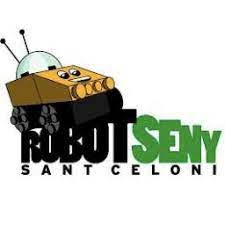
They are members of the Pedagogical Resource Center (CRP) VOIII of Sant Celoni. All three are Robotseny training teachers and facilitators, together with the Robotseny promoters, the Town Councils and different companies involved in this project.

Engineer and postgraduate in Technology Teaching by the Universitat Politècnica de Catalunya (UPC), he has published didactic materials for teaching technology to various publishers, the Department of Education, and the National Museum of Science and Technology of Catalonia. He has collaborated with several educational equipment firms to design and develop educational resources and user guides. He was a former teacher in the master’s degree for secondary school teachers at the UPC and currently a trainer of trainers at the Department of Education. He is a Technology and Electronic Systems professor at secondary education.
Esther Pintó Pagès, Head of Studies, INS Torrevicens (Lleida) Coordinator of the ICE STEAM Team, (Lleida).
Moderator: Fina Guitart, member of the scientific field of CESIRE, Department of Education, Generalitat of Catalonia. Barcelona.
Lleida is one of the leading territories in the STEAM fields. We have hosted national and international competitions such as Ciencia en Acción, APEA meetings and Encuentro de Divulgadores de Ciencia, among others, in which teachers and students from the area actively participate. Some of the most successful performances are: Science in the Street, a fair where students of all ages show their scientific and technological projects to the public; Anna Gené Congress. We do science at school, a formal congress where primary school children present their research projects to other classmates of a similar age; Mercatec Lleida, a technology market where technology projects from all over the country are exhibited; and STEAM conferences in the two areas of action: teachers and students. Lately, virtuality has led us to new models open to the whole territory, such as the STEAM Relays and the STEAM Experience Exchange Days.
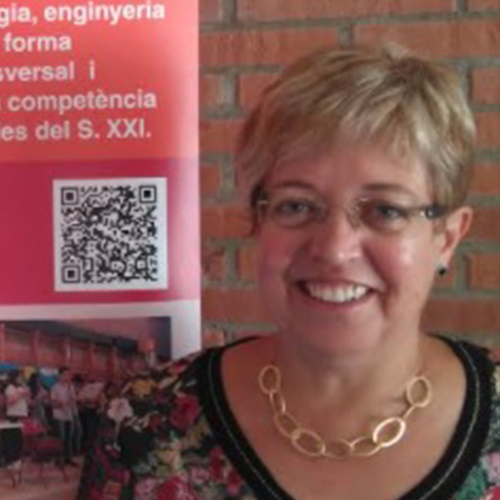
PhD in Engineering by training but a vocational teacher and passionate about STEAM, but above all learning from her classmates and students. Currently she is Head of Studies INS Torre Vicens (Lleida), Professor at the Universitat de Lleida (UdL) Department of Chemistry and Coordinator of the ICE STEAM Team, the engine of change at the UdL
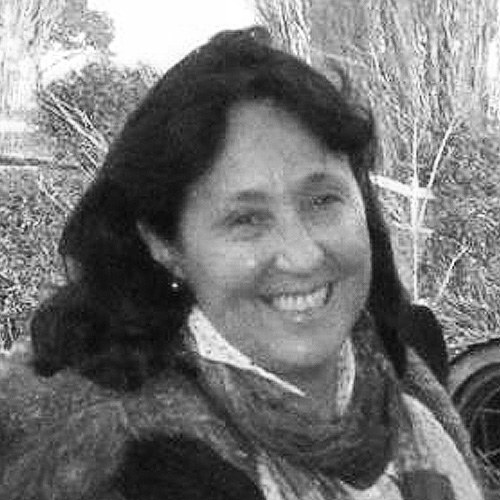
Associate professor in the Department of Didactics of Mathematics and Experimental Sciences of the Universitat de Barcelona, (UB) in the Master’s Degree in Secondary Teacher Training (Physics and Chemistry itinerary), coordinates and participates in various interdisciplinary projects and innovation groups in the field. She is the author of articles on science didactics and co-editor of the magazine Educación Química EduQ.
Anicet Cosialls Manonelles, Professor of Physics and Chemistry, Guindàvols Institute of Lleida.
Moderator: Fina Guitart, member of the scientific field of CESIRE, Department of Education, Generalitat of Catalonia. Barcelona.
A project carried out with students from the 1st year high school where the challenge to be solved is to make an inquiry about the nature of the Moon using creative and simple experimental techniques, and materials available to everyone. An attempt that will be made to answer the following questions: How to experimentally determine the radius of the Moon? How to determine its severity? And its density? Is the Moon a rocky celestial body? From the images recorded of the Moon with a reflex camera attached to a telescope, a lunar map will be made identifying the most significant craters and seas. An estimate of the height of the craters will also be made from the measurement of the lengths of their shadows. Finally, another challenge will have to be solved: how to create a 3D image of the moon from the recorded images?
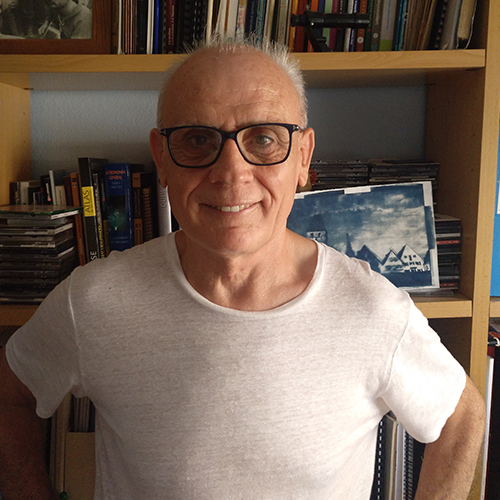
He has a degree in chemical sciences and is a professor of Physics and Chemistry at the Institut Guindàvols in Lleida. Trainer Professor in physics and experimental chemistry courses aimed at secondary school teachers, and scientific communicator. As a Professor, he has tutored research works in the fields of physics, chemistry and astronomy that have been recognized with different awards and competitions. Finalist in several editions of ‘Science in Action’ in the modalities: Physics Demonstrations, Chemistry Demonstrations, Adopt a Star, Scientific shorts, etc. He has also participated in ‘Science on Stage’ in Brussels. He has actively collaborated in the tasks of organizing the 14 editions of Science on the Street. In 2009, he was awarded with the Catalonia Prize for Education in the modality of teacher (Marta Mata prize).

Associate professor in the Department of Didactics of Mathematics and Experimental Sciences of the Universitat de Barcelona, (UB) in the Master’s Degree in Secondary Teacher Training (Physics and Chemistry itinerary), coordinates and participates in various interdisciplinary projects and innovation groups in the field. She is the author of articles on science didactics and co-editor of the magazine Educación Química EduQ.
Marisa Salgado Vallvey, secondary school Physics and Chemistry teacher, El Cairat institute, Esparraguera (Barcelona).
Moderator: Fina Guitart, member of the scientific field of CESIRE, Department of Education, Generalitat of Catalonia. Barcelona.
The participation of secondary school students in meetings, in a scientific congress format, with other educational centers encourages the consolidation of the knowledge acquired, awakens their interest in science, enhances their creativity, their communication skills and their critical spirit, in addition to contributing to the acquisition of habits of socialization and respect for others. During the 2005-2006 academic year, from the Physics and Chemistry seminar of the El Cairat institute, we launched a voluntary activity with ESO students entitled Projectes en Ciències, that aimed to promote the youthful research spirit and bring students closer to science. This initiative germinated in the project Taste and Passion for Research, which is currently still active. The Project received the Recognition of pedagogical innovation projects by the Department of Education of the Generalitat de Catalunya (ENS / 1542⁄2018). At the beginning, the students exhibited their research in the Exporecerca Joven, a sample of research works by young people between 12 and 25 years old. This experience opened up other ways of living science. At that time, there was a lack of spaces in which ESO students could disseminate their research. This fact encouraged us to be promoters of forums. Thus, at the end of 2010, the Forum Intercomunitari de Recerca Jove was born: a meeting, held annually in Galicia, aimed at ESO students from any community and open to the public. In the 2013-2014 academic year, we created the Research Afternoon, a meeting of young people from ESO in Catalonia. In addition, the students of the center can present their research in the town schools that have hosted us one afternoon for years. Currently there are external institutions that organize conferences in the form of a scientific congress, although in these cases the subject of the works is no longer free. We highlight here the Young Photonics Congress, organized by Catalan Institut of Photonics (ICFO) and the Universitat de Barcelona (UB) Crystalització a l’escola Contest.
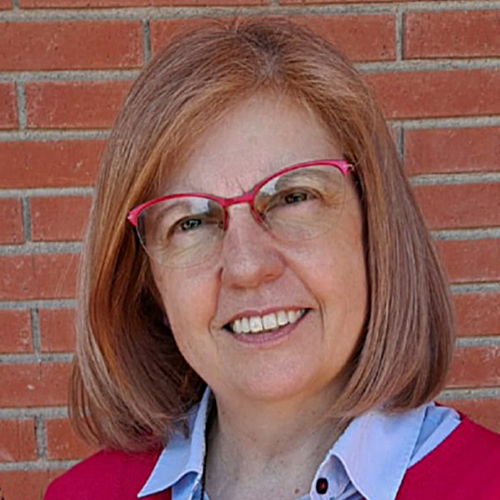
A secondary school Physics and Chemistry teacher at the El Cairat institute for more than 30 years. She is the promoter of numerous projects, both external and internal. She is co-creator of the group Gust i Pasió per investigar, which received the Recognition of pedagogical innovation projects by the Department of Education of the Generalitat de Catalunya (ENS / 1542⁄2018). High school tutor and coordinator. Award of the Catalan Society of Chemistry to Educational Excellence 2021.

Associate professor in the Department of Didactics of Mathematics and Experimental Sciences of the Universitat de Barcelona, (UB) in the Master’s Degree in Secondary Teacher Training (Physics and Chemistry itinerary), coordinates and participates in various interdisciplinary projects and innovation groups in the field. She is the author of articles on science didactics and co-editor of the magazine Educación Química EduQ.
Toni Moreno, president of Robolot Team, Olot, (Girona).
Moderator: Jordi Regalés Barta, technical professor at the technological area of the CESIRE, Department of Education, Generalitat of Catalonia.Barcelona
The air we breathe has nothing to do with what previous generations breathed. And, as a secondary effect of the acceleration of a poorly understood progress, we are spoiling the environment that we will leave to future generations, to the point of being incompatible with people’s health.Here education has a lot to say. And at the Escola Institut Greda in Olot, accompanied by the Robolot Team, two or three courses have already been dealing with the subject in a very experiential way, taking didactic measures that provide data on the air that is breathed in the school, as well as interacting with Experts that helps us to obtain very real and current information about the problem, to find solutions, both technical and habit-based. Robolot Team, in collaboration with the Department of Education and other actors, have set up an informal EDUCATIONAL NETWORK for air quality measurement where more than 100 Educational Centers share data. The Institut Escola Greda is the benchmark.
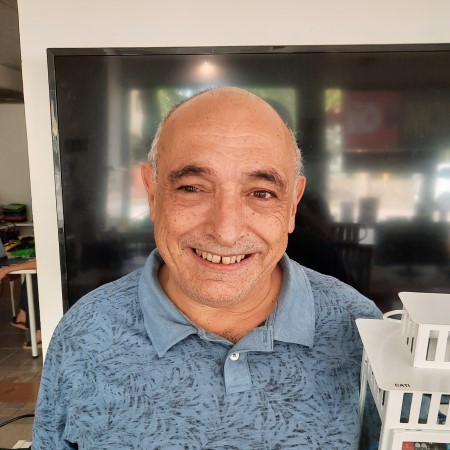
He has been a trainer in robotics and automation at INS La Garrotxa and IOC. As a teacher trainer, Toni, worked at the Institute of Education Sciences of the Universitat de Girona (ICE UdG) and the Institute of Education Sciences of the Universitat Politècnica de Catalunya, BarcelonaTech (ICE-UPC), at CESIRE and the Subdirectorate General for Educational Innovation of the Generalitat de Catalunya He currently chairs the Robolot Team.

Engineer and postgraduate in Technology Teaching by the Universitat Politècnica de Catalunya (UPC), he has published didactic materials for teaching technology to various publishers, the Department of Education, and the National Museum of Science and Technology of Catalonia. He has collaborated with several educational equipment firms to design and develop educational resources and user guides. He was a former teacher in the master’s degree for secondary school teachers at the UPC and currently a trainer of trainers at the Department of Education. He is a Technology and Electronic Systems professor at secondary education.